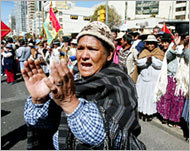Bolivia protesters, leaders fail to meet
A crucial meeting between protesters demanding nationalisation of Bolivia’s natural gas and the new caretaker President Eduardo Rodriguez has failed to take place, a union leader said.

Regional union leader Roque Romero said Ivan Aviles, Rodriguez’s representative, failed to reply to protesters’ demand that the meeting, scheduled for 1800 GMT on Saturday, be held at a military base 12km west of the capital, La Paz.
The base at El Alto became the epicenter of unrest in weeks of turmoil that led to the departure of President Carlos Mesa this past week.
Rejecting offer
Union leaders declined Rodriguez’s invitation to meet in La Paz at the Quemada Palace, saying Rodriguez would have to go to El Alto.
Union leaders said they were allowing “a sort of truce” so Bolivians could stock up on food and fuel after severe disruptions these past weeks.
“We agreed to have a dialogue with the president and we are doing it in El Alto, and our (protest) measures will resume on Monday,” said Romero.
|
“We agreed to have a dialogue with the president and we are doing it in El Alto, and our (protest) measures will resume on Monday” Roque Romero, union leader |
But because there was no meeting in the end, “we decided to suspend everything and to ratify the demonstrations scheduled for next week,” said Romero.
Organized protests
The upcoming protests, agreed upon later on Saturday by leaders of several union entities, include blocking highways and demonstrations calling for the nationalisation “and the industrialisation” of Bolivia’s energy industry, he said.
In one of the measures, protesters will gather at the Bolivian Congress on Tuesday calling for its closure.
“We are launching Round Two against the system,” the union leader said.
During Saturday’s respite, trucks rumbled out of a facility in Senkata, El Alto, to begin deliveries for the first time in days.
Signs of normalcy
A semblance of normalcy began to develop in the capital; long lines of cars snaked out of service stations waiting to fill their tanks after days of supply trouble.
In El Alto, many industries had to lay off workers amid the unrest.
Rodriguez took over from Mesa late on Thursday and promised general elections before the end of the year in an effort to end weeks of unrest.
Mesa was the second president in 20 months to be forced to resign by the poor masses seeking a greater share of the wealth from Bolivia’s energy resources.
Renewed strike threat
 |
|
Tens of thousands of demonstrators |
While some roadblocks were taken down Friday, thousands of people took part in marches in La Paz, and a high-profile community leader, Abel Mamani, said street protests would start again unless nationalisation began within 72 hours.
“There has only been a changing of the guard,” said Miguel Zubieta of the mine workers’ federation, highlighting how the authorities had not made any concession on calls for the nationalisation of oil and gas reserves.
Evo Morales, a left-wing leader of coca leaf farmers, began agitating on the gas issue before Rodriguez was sworn in. Rodriguez “must nationalise the gas (industry) and commit himself to call a constitutional assembly”, said the leader of the Movement Toward Socialism.
For three weeks, tens of thousands of farmers, workers and indigenous people in the Andean country of nine million clamoured in La Paz and other cities for the nationalisation of the gas and oil industry as part of a more equitable distribution of wealth.
Cause of strife
The protests began after Congress passed a law last month forcing oil and gas companies to pay extra taxes and royalties. Protesters said the measure did not go far enough.
Bolivia’s crisis pits poorer regions around La Paz against the more prosperous eastern and southern plains, where most of the natural gas is. The political system is dominated by people of European descent, while the indigenous majority struggles with grinding poverty.
One miner was killed in the hours before Mesa’s resignation, and four other protesters died in a road accident; but they were the only deaths reported in the unrest.